WAR CRY

The certainty of new life in the message of Easter


The certainty of new life in the message of Easter
The Salvation Army is a Christian church and registered charity seeking to share the good news of Jesus and nurture committed followers of him. We also serve people without discrimination, care for creation and seek justice and reconciliation. We offer practical support and services in more than 700 centres throughout the UK. Go to salvationarmy.org.uk/find-a-church to find your nearest centre.
The Salvation Army first published a newspaper called the War Cry in London in December 1879, and we have continued to appear every week since then. Our name refers to our battle for people’s hearts and souls as we promote the positive impact of the Christian faith and The Salvation Army’s fight for greater social justice.
Editor: Andrew Stone, Major
Deputy Editor: Philip Halcrow
Staff Writer: Emily Bright
Staff Writer: Claire Brine
Staff Writer: Ewan Hall
Editorial Assistant: Linda McTurk
Graphic Designer: Mark Knight
Graphic Designer: Natalie Adkins
Email: warcry@salvationarmy.org.uk
The Salvation Army
United Kingdom and Ireland Territory 1 Champion Park London SE5 8FJ
Tel: 0845 634 0101
Subscriptions: 01933 445445 (option 1, option 1) or email: subscriptions@satcol.org
Founders: William and Catherine Booth
International leaders: General Lyndon Buckingham and Commissioner Bronwyn Buckingham
Territorial leaders: Commissioners Jenine and Paul Main
Editor-in-Chief: Major Julian Watchorn
A dramatic crime wave has hit TV and streaming platforms. Whether it’s the cosy feel of clerics solving mysteries or the gritty storylines of inner-city murders investigated by detectives battling their own demons, viewers can’t seem to get enough of whodunnits. In this week’s War Cry we preview the new series of ITV1 police drama Unforgotten, where Sanjeev Bhaskar and Sinéad Keenan have more cases to solve.
There are several customs and traditions that can make Easter special. For some people, it’s the hot cross bun, with the huge variety of flavours now available. For others, it’s the long four-day weekend, giving them the opportunity to unwind. For many, though, the excuse to eat huge amounts of chocolate is the highlight of the weekend.
Perhaps the popularity of these crime dramas is explained by the satisfaction that viewers gain from seeing wrongs put right and the guilty brought to justice. Often the shows’ wrong’uns are bad to the core and have deliberately chosen to follow a life of crime.
In this week’s War Cry we find out more about two very specific Easter traditions. The first is the associating of eggs with this time of year. In an interview with Dr Michael Carter of English Heritage, we discover that eggs and their connection to Easter date back to a time long before anyone had thought of making a hollow chocolate egg.
However, according to people who work with offenders, the reality is often far more complex. After becoming a prison chaplain, the Rev Tracy Sickel quickly realised that various factors played a part in women becoming inmates.
Michael says that there is evidence dating back to the 13th century of people following the custom of giving decorated eggs at Easter.
‘I sat down with women in their induction interviews on their first day in prison,’ she tells us, ‘and it was the same things I was hearing continually: lack of self-esteem, abusive relationships, trauma, unforgiveness and addictions. Often they were victims themselves.’
‘King Edward I purchased 450 coloured and gilded eggs to distribute to his courtiers,’ he tells us.
The other Easter tradition we hear about in this issue is the one followed by the many Christians who get up before the sun has risen in order to attend an outdoor service. Salvation Army minister Major Nick Cotterill tells us why he’ll be out of bed before 5am on Easter Sunday.
While Tracy never dismissed the implications of the women’s crimes, some years ago she grew disheartened at seeing women returning to prison after their release. So she established a Christian charity, Imago Dei, to support them once they had completed their sentence.
As well as offering practical help, Tracy wants to show the women how a relationship with God can help them.
‘Jesus conquered death and we meet together at sunrise on Easter Sunday to celebrate that,’ Nick says. ‘His death in and of itself wasn’t good, but the fact that he rose again is the best news possible.’
‘We work with people of all faiths and none in prisons,’ she says. ‘We build relationships, placing value on the women and helping them see themselves as the Lord sees them... We then allow the Lord to step in and do what only he can do – transform lives.’
He explains: ‘Jesus died and took the punishment for our sins – for the things we’ve done that are wrong – and Easter is a celebration of that.’
Ultimately, Easter is not so much about what we do but about what Jesus did for us. If we decide to follow him, our whole life will become special – not just at Easter but throughout the year.
God’s offer to transform lives is for us all, no matter who we are or what we have done. If we allow him space in our heart, we’ll detect changes in our character that we couldn’t have possibly imagined.




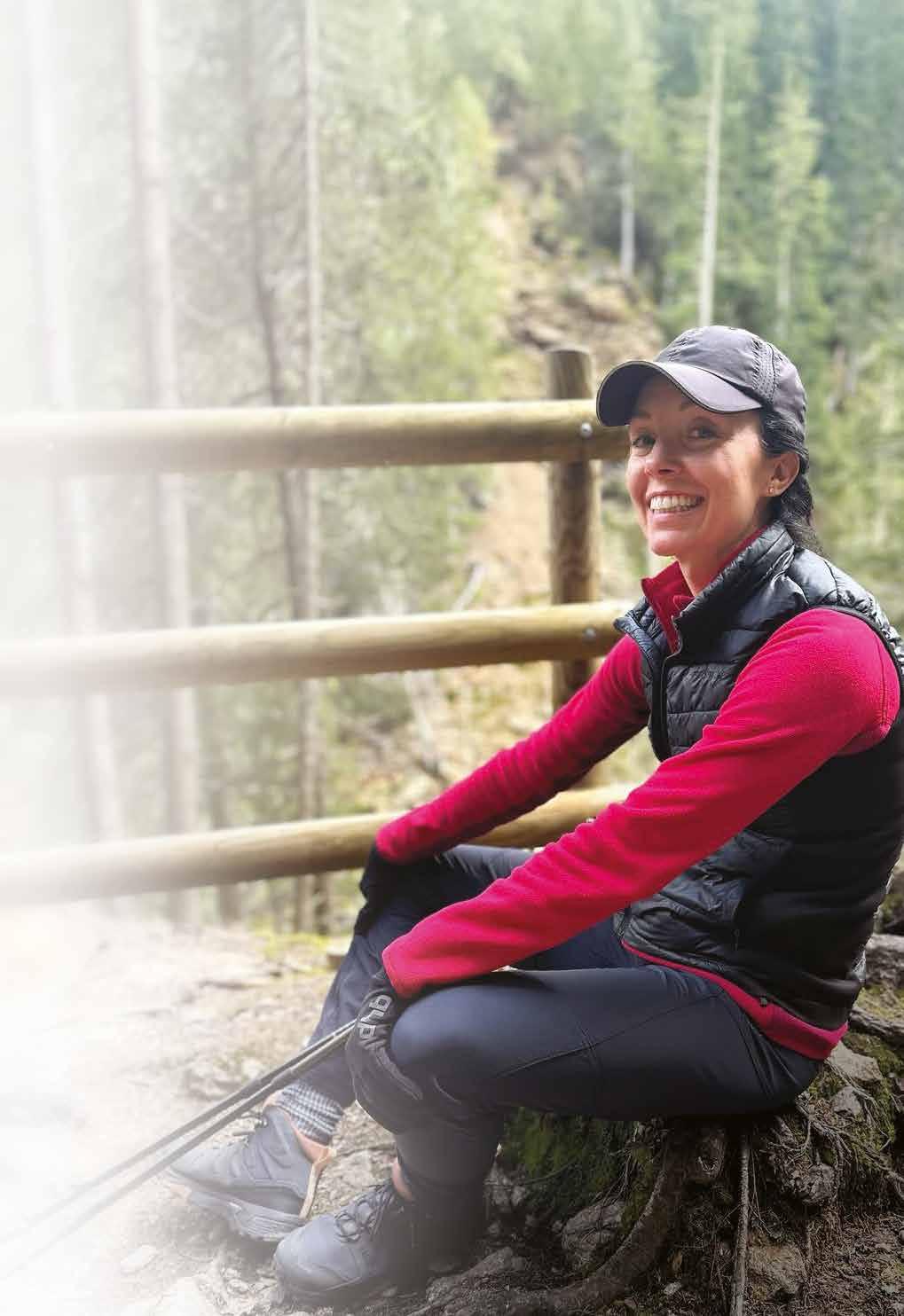
Interview by Emily Bright
‘W hat surprised me the most,’ says threetime Paralympic medallist, sports broadcaster and now pilgrim Stef Reid, ‘was how easy it was to get along with people and reach a state of authenticity from the first day. We connected so early on, with a base level of respect, love and kindness.’
The retired long jumper and sprinter, who is a Christian, is recalling her experiences on BBC2 documentary series Pilgrimage: The Road through the Alps during a press event in a London hotel’s screening room. In the series, seven celebrities set off from Inzing, Austria, on a 300km medieval Christian pilgrimage route. Their final destination is Einsiedeln Abbey in Switzerland. All episodes will be available on BBC iPlayer from Easter Sunday (20 April).
Stef’s fellow pilgrims include Jay McGuiness, an agnostic and former member of boy band the Wanted; TV presenter Jeff Brazier, who practises meditation; and actor Helen Lederer, whose father was culturally Jewish and whose mother was Protestant. Also making the journey are Traitors star Harry Clark, a practising Catholic; stand-up comedian Daliso Chaponda, who is investigating the Baha’i faith; and journalist Nelufar Hedayat, who describes herself as a modern Muslim.
Stef found that being part of such a diverse group enriched her pilgrimage. And being thrown together with a group of strangers certainly had its lighter moments. One celebrity – unaware that Stef’s right foot was amputated when she was a teenager – managed to say exactly the wrong thing, much to the para-athlete’s amusement.
‘Daliso went on to this whole terrain about, “Could you just imagine if you were doing this and you only had one foot? How awful!”
‘I’m walking at the front, trying not to laugh. By that point, I had sussed Daliso out and I knew that he’s a comedian, so he’d be strong
Turn to page 4 f
enough to handle it when he did find out.’
Later on, I sit down with Stef for a one-to-one interview. She’s engaging, answering questions about her faith thoughtfully. She reiterates how much she enjoyed being with her fellow pilgrims.
‘It felt like one of the best churches I’ve ever been to. For me, that’s what church is – it is people that have come together and have committed to each other, not knowing what the outcome could be, but we’re just figuring out life together.
The conversation we had was hugely powerful
‘Itcan be hard work being with other people, in the sense that there’s an element of chaos, but actually the tradeoff of that is community and connection.’
Stef says that being questioned by people with different beliefs made her examine her own more closely.
‘If you’ve only ever grown up in a church, you take for granted certain doctrines. Jay asked me some amazing questions, and I was like: “I don’t know.”
But two days later, I thought: “I’ve wrestled with this a little bit and this is now what I think.”’
Stef also had an opportunity to learn about other faiths. During one dinnertime discussion, Daliso spoke of his interest in the Baha’i faith, which believes that all religions are equally valid routes to God.
I wonder what she made of what he said.
‘I love the idea of a peace between religions, but not at the cost of downgrading Jesus Christ. To me, he was not just a prophet or a good teacher. It’s said that Jesus was either a liar, he was crazy, or he really was the Son of God. I cannot release Jesus from that identity of Son of God, because if he wasn’t that, for me there’s no power in Christianity.’
Stef is honest with me about how hard she found it when her faith was being challenged.
‘Initially when somebody disagrees with you, you get an element of defensiveness, but it’s only because you feel like they’re tearing at you. It is definitely a skill to learn – to not react,
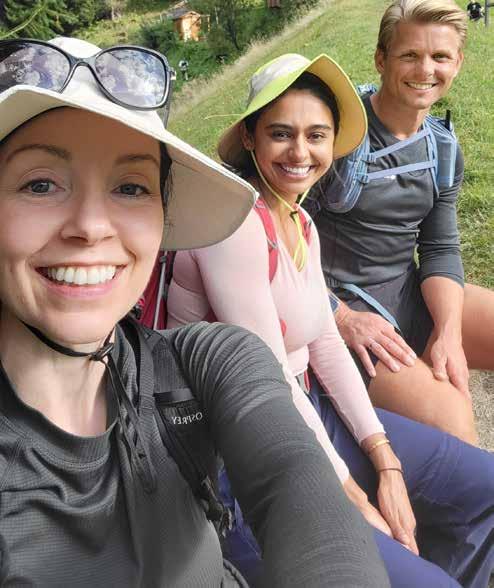

think about it and come back the next day.’
The pilgrimage prompted Stef to re-examine other big life questions too. One night, the group stayed at Kronburg, an Austrian spiritual retreat run by the Sisters of Mercy. Wrestling with whether or not she and her husband Brent Lakatos should have children, Stef sought out the counsel of Sister Nathanja.
‘The conversation we had was hugely powerful,’ Stef remembers. ‘When I asked her how she knew she was called to this life – obviously she’s not having kids herself – I was expecting her to say, “God appeared in the sky, I’ve never questioned my decision.”
‘But her answer was actually: “I struggled. It was a difficult decision to make. Some days I wonder, did I make the right decision? I miss my old life, my old job, my old friends.”
‘I realised that, even as a nun, she lives with tension and uncertainty. Her response reshaped my expectations – you’re never going to be at a place where you’re like: “This is sussed, I’m good.” But that’s normal, and I’m OK with that.’
It strikes me that Stef is no stranger to facing uncertainty. In the first episode of Pilgrimage, she explains how growing up in Canada, she wanted to become an international rugby player. But when she

was 15, she nearly lost her life in a boating accident.
Her right foot was amputated, and she had to re-evaluate her life goals. Around that time, she began exploring Christianity. In the programme, Stef asserts: ‘I knew, without doubts, God saved my life.’
I have a Creator God who loves me
Stef turned her attention to education, studying for a biochemistry degree at Queen’s University in Canada, where her faith flourished. While there, she discovered her first running blade and wondered how fast she could still run. A career in para-athletics came calling and she went on to compete first for Canada and then for Great Britain.
Since retiring in June 2022, Stef has worked as a sports pundit and commentator for Channel 4 and the BBC.
‘My life is so different from what I ever expected,’ she muses. ‘You never know what’s coming round the corner. In my faith, I’m always hopeful that there’s going to be a better outcome at some point. Sometimes I don’t know how I would face every day if I didn’t have that kind of hope.’
As Stef explains to me, her life hasn’t been ‘smooth sailing’. But knowing that God is alongside her gives her strength.
‘I’ve had a great life, and I’m so thankful for that. But there have been a lot of difficult moments. What anchors me is that I have a Creator God who loves me, and he wants the best for me.
‘When I wasn’t winning races, I was angry, because I was training harder than other competitors. They weren’t even Christians, and they were winning. I thought: “This is outrageous.” But if I actually go through the Bible, I see that God promises to be with me, and it’s that relationship that matters the most. I have a God who genuinely wants the best for me.
‘There are just so many things in my life that I can see God’s hand in. Even if I’m in a situation that I don’t particularly enjoy, he is with me. He’s a God that got stuck in, came down to Earth and died for us.’
Stef is also reassured by the truth that, regardless of what she may face, God will help her through.
‘One of the benefits of faith is that there is an element of security, and I am able to take risks. I know that even if I unintentionally and totally mess up, I serve a God who can redeem pretty much anything.’
Your prayers are requested for Raymond, who is in a care home and has dementia, that he will be well looked after.
The War Cry invites readers to send in requests for prayer, including the first names of individuals and details of their circumstances, for publication. Send your Prayerlink requests to warcry@ salvationarmy.org.uk or to War Cry, 1 Champion Park, London SE5 8FJ. Mark your correspondence ‘Confidential’.
There is no set formula to becoming a Christian, but many people have found saying this prayer to be a helpful first step to a relationship with God
Lord Jesus Christ, I am truly sorry for the things I have done wrong in my life. Please forgive me. I now turn from everything that I know is wrong.
Thank you that you died on the cross for me so that I could be forgiven and set free.
Thank you that you offer me forgiveness and the gift of your Holy Spirit.
Please come into my life by your Holy Spirit to be with me for ever.
Thank you, Lord Jesus. Amen


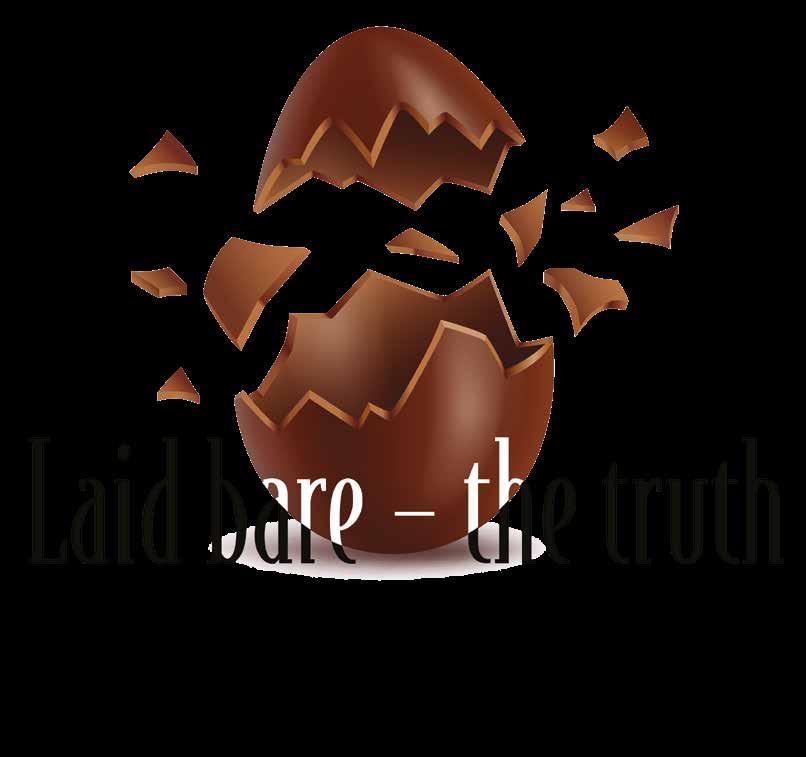
hillsides.
Eggs play a part in many Easter traditions, and Dr Michael Carter of English Heritage has been looking back to see how society has liked its eggs at this time of year.
In setting out what is known from medieval times about the association of eggs with the most important weekend in the Church’s calendar, Michael points to the period of fasting that traditionally preceded Easter.
‘In Lent, you could not eat any fats, and that included eggs,’ he says. ‘Eggs were one of the few sources of readily available protein for the poor – more accessible than meat – and so it must have been a great physical and emotional release to be able to eat them again when your Lenten abstinence ended and you could celebrate Easter.’
But people were doing more than simply eating eggs. Michael says that there is

evidence dating back to the 13th century of the custom of giving decorated eggs at Easter.
‘King Edward I purchased 450 coloured and gilded eggs to distribute to his courtiers,’ he explains.
Not all eggs were golden, but ‘the practice of giving decorated eggs continued and was widespread by the 19th century’. These decorated gifts
and distributed as alms to the poor at Eastertide’.
Customs grew up around such practices.
‘The giving and the collecting of eggs continued into the 17th century and beyond and were surrounded by rituals and songs, which is what you see with all begging customs,’ he says. ‘These ceremonies for collecting foodstuffs at calendar festivals are basically a form of licensed begging – it’s a way of alleviating poverty so that it isn’t considered as just routine begging. The ceremonies make it palatable and acceptable. But they also affirm the social bonds – everyone has a place either as a giver of charity or a recipient of charity.
‘It’s a bit of fun as well. We have evidence from 18th-century Lancashire of the collecting of eggs being accompanied by dancing and verse.
‘Groups of people known as “egg
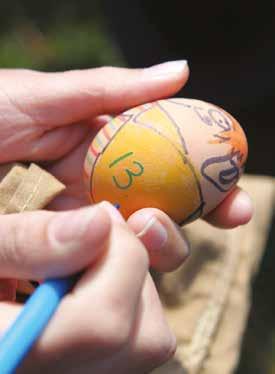
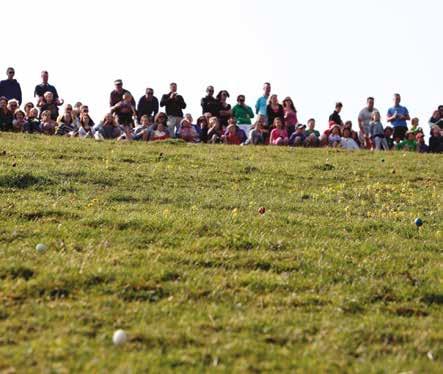
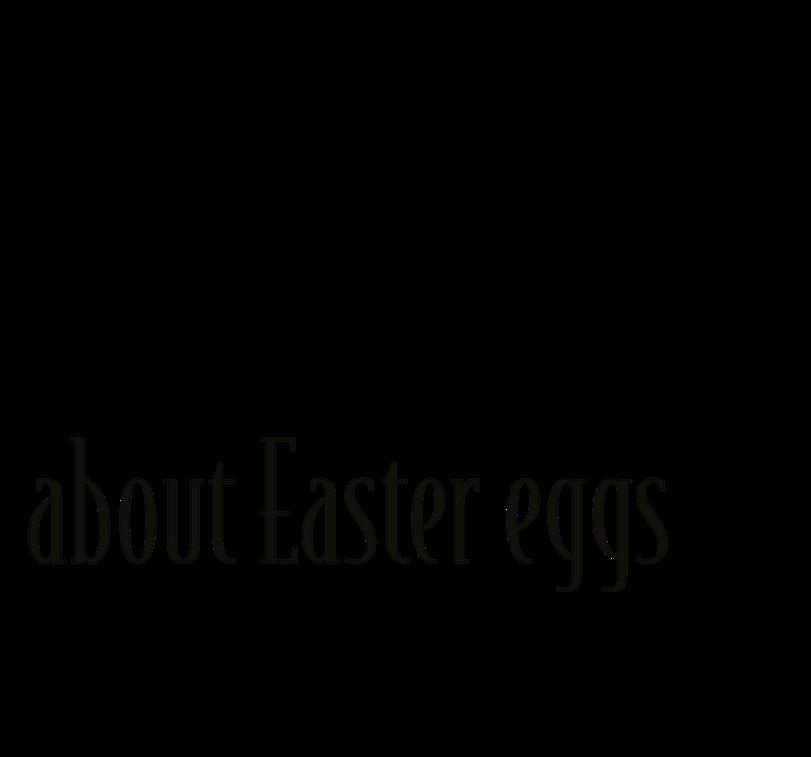
pacers” are recorded from the early modern period, and they would go door to door to collect for charity. They would be wearing costumes and they would cavort and chase people. It was a way of letting off some steam. Easter was the first big calendar festival since Christmas and Plough Monday, and – with the lighter days – it offered a chance for communal activities again.’
The lighter days and potentially warmer weather may also have encouraged the development of Easter games such as egg rolling, in which communities gather to roll eggs down hillsides and see which travels the furthest without breaking.
The tradition seems have been spreading during the 1800s – though today it is not nearly as widespread as another feature of Easter that entered the historical record during the 19th century.
‘Fry’s began selling chocolate eggs in 1873, using dark chocolate,’ says Michael. ‘Milk chocolate later became the most popular type, after it was introduced by Cadbury in 1897. But it wasn’t until the mid-20th century that chocolate eggs were being mass produced and assumed the
role of being a ubiquitous symbol of Easter consumption.’
The date for Fry’s first chocolate egg can be pinned down. Other aspects of the history of Easter are more difficult to unscramble.
Even the origins of the word ‘Easter’ are unclear. It is sometimes said that it derives from Ēastre, the name of a goddess associated in pre-Christian times with spring. But scholars are far from convinced by that interpretation of the evidence, which is based on the writings of one historian who lived in Anglo-Saxon times.
‘Our source for that explanation is Bede, and nobody else,’ says Michael. ‘So it’s far from certain.’
Also less than clear is the development of the symbolism that is sometimes attached to eggs at Easter. Today people may say that eggs represent the new life


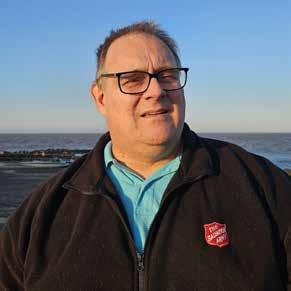
Major NICK COTTERILL, co-leader of The Salvation Army in Lowestoft, explains why he will be getting up before sunrise on Easter Sunday
Interview by Andrew Stone
Sundays are sometimes referred to as the day of rest, but this coming Sunday morning (20 April) many Christians across the UK and Republic of Ireland will be getting up very early –even before the crack of dawn.
‘I imagine I’ll be getting out of bed at about 4.45am,’ says Major Nick Cotterill who, along with his wife Major Anita Cotterill, runs The Salvation Army’s work in the Suffolk seaside town of Lowestoft.
The reason that Nick and thousands of other Christians are having such an early start is that they will be attending sunrise services – acts of worship, usually held outside, marking Easter Day.
‘This year the sun rises at 5.44,’ Nick says, ‘so to make sure that we actually see it rise properly, our service will begin at 5.30 – although we’ll arrive before
that to set up.’
The people who will be helping Nick set up are the members of the Salvation Army band, who will accompany the hymns that will be sung by Christians from the various churches in the town. The service will also include prayers, Bible readings and a sermon – elements that will be featured at other similar gatherings held across the country.
What makes the Lowestoft sunrise service particularly special, though, is that it will be held right by the sea at Ness Point, which is the mostly easterly part of the United Kingdom. It means that those attending will be the first in the country to see the sun appear on the horizon – weather-allowing.
‘It was very cloudy last year and we didn’t see the sun,’ says Nick with a chuckle. ‘But we did see it the year before, and it is a glorious sight to
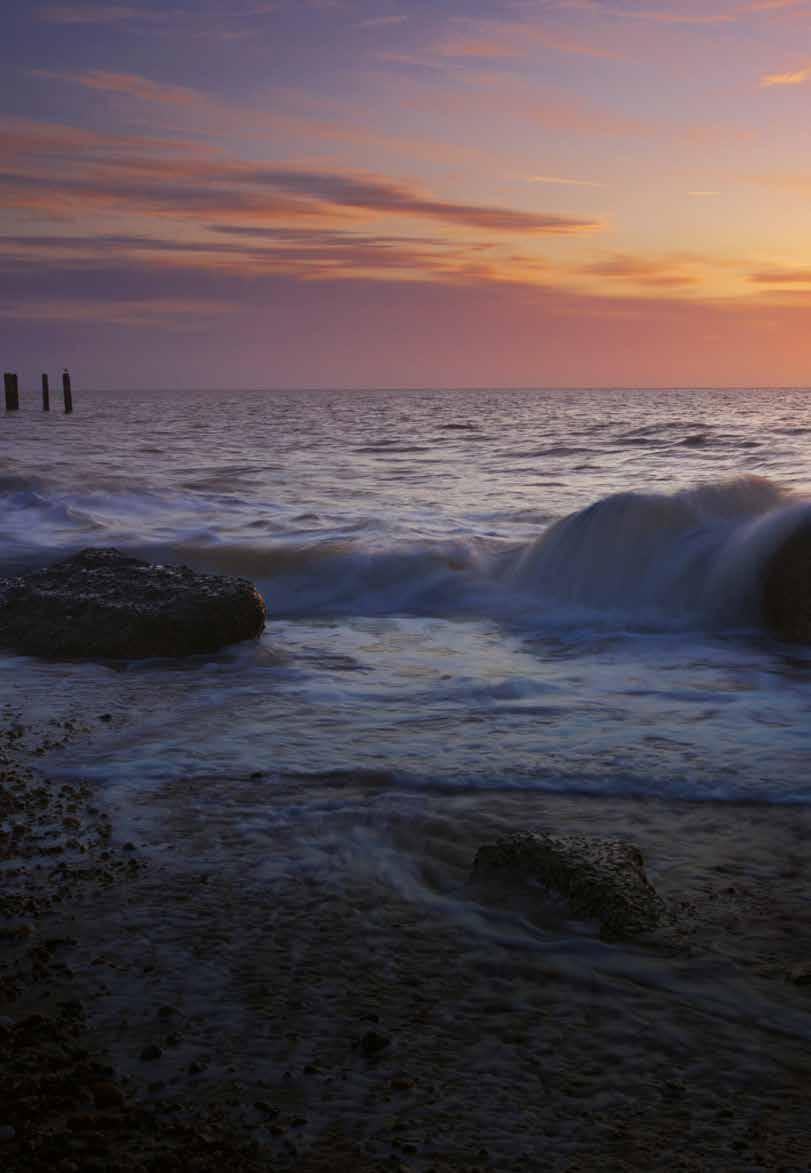
behold. Just seeing the sun peek over the horizon of the North Sea is quite spectacular.’
But that early-morning sun doesn’t bring much warmth with it.
‘It doesn’t matter whether Easter takes place in April or March, because the wind comes off the sea, so it’s always cold!’ Nick admits. ‘That time in the morning, we have to wrap up warm.’
Despite the cold temperatures, however, and the fact that the sun may not even be visible, the sunrise service is important to Nick.
‘It’s a celebration of our faith,’ he enthuses. ‘We believe that Jesus rose again on the third day after he died –that’s foundational to our faith. If he had never risen from the dead, then everything else that he said wouldn’t have been true either.
‘In some respects, the sunrise service

is the most important service that we take part in throughout the whole year.’
Nick also explains why it is held so early in the day.
‘In the Bible, it says that ladies went to Jesus’ tomb on the third day before sunrise. It was then that they discovered that Jesus’ body wasn’t there. We gather before sunrise to celebrate that fact.’
However, those women, who on the Friday had seen Jesus crucified on a cross, would not have been sharing that celebratory feeling as they made their way to the tomb. And they wouldn’t have been looking forward to the task they thought they were going to be carrying out.
‘They were going to the tomb to anoint Jesus’ dead body,’ Nick explains. ‘He had been put in there on Friday, so I would imagine they would have
expected the body to smell. The earlier they got there, the better, as the smell would have got worse when the sun rose and the day got warmer.
They wouldn’t have had a clue what was going on
‘The women would have been despondent and all over the place after seeing Jesus suffer such an awful death. They would have thought that it was the end – that everything Jesus had said wasn’t true and that there was no reason for them to keep on believing.
‘Then they would have looked and seen an empty tomb and thought, “What’s this about?” It was only later in
the day that they would have realised the significance of it all. At that point they just wouldn’t have had a clue what was going on.’
The Bible describes how, as the morning went on, Jesus appeared to a number of his followers and showed them that he was alive. The people he appeared to included the women.
‘For them to have discovered that what Jesus said was true must have come as a revelation and a shock,’ Nick says. ‘Christians today still believe that Jesus died and took the punishment for our sins – for the things we’ve done that are wrong – and Easter is a celebration of that.
‘Jesus conquered death, and we meet together at sunrise on Easter Sunday to celebrate that. His death in and of itself wasn’t good, but the fact that he rose again is the best news possible.’
Hollywood voice actor JAMES ARNOLD TAYLOR reveals how a new film is looking at the Gospels through a different lens and tells how God made the worst day of his life into the best
Interview by Emily Bright
‘It doesn’t get better than playing the young Jesus,’ says Hollywood voice actor James Arnold Taylor. His latest animated project, King of Kings, depicts Charles Dickens retelling the life of Jesus to his son, Walter. The film, out now in UK cinemas, has been a six-year passion project for James.
‘When I started on the film, I was one of the voice actors brought in to read the whole story before the cast was put together,’ he says when he video-calls me from his studio, where a
King of Kings poster has pride of place alongside other memorabilia from his career. ‘I was hoping that I would have at least one of the roles in the final film.’
He has more than one. In a cast that also includes Pierce Brosnan, Uma Thurman and Ben Kingsley, James provides the voices for Jesus at 12 years old; the disciples Matthew, Philip and Thomas; Melchior, one of the wise men; and a scribe of King Herod.
‘Playing multiple characters is great fun,’ he enthuses. ‘But in some ways, it’s just another day at the office for me. I’m in a little padded room, talking to myself as a voice actor.’
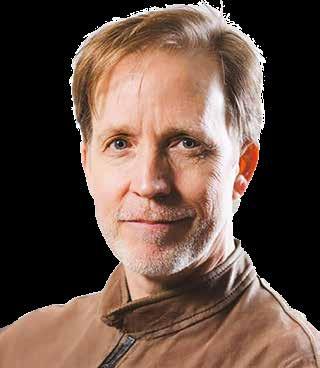
The film charts Jesus’ life from the Nativity to the Easter story of the Resurrection, complete with some of his miracles and teachings. But, unlike other adaptations, King of Kings is narrated through the character of Victorian novelist Charles Dickens, as voiced by Kenneth Branagh. This angle is rooted in fact.
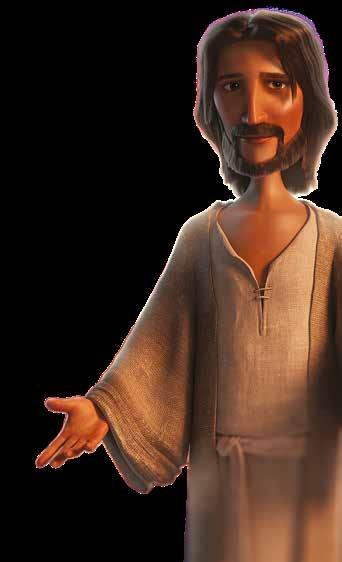
Jesus (voiced by Oscar Isaac) in ‘King of Kings’
Walter’s viewpoint.
‘The film is based on the book that Charles Dickens wrote in 1846 for his children, The Life of Our Lord,’ James explains. ‘He thought it was important that his children knew the Gospels.’
As Dickens tells the story, his son Walter imagines himself at the centre of it, watching events unfold.
I’m intrigued by the parallels between Jesus’ teaching about receiving the Kingdom of God like a child and the story being seen from
‘I love that you brought that up,’ says James. ‘An actor friend who was at the US premiere with me said: “I got to re-experience the story of Jesus, which I’ve known my whole life, through the eyes of a child. And that’s how we are supposed to do it.”
‘There’s a beautiful scene where Walter is under water and is rescued by Jesus, who cradles him. That is exactly what Jesus is doing with us every day. Whether we know it or not, he is holding us in his arms, carrying us through the storms of life.’
James sees Jesus as an essential part of his life.
‘He is the reason I have breath in my lungs and that I am alive and well. I am grateful to him for everything that I experience. He has blessed me with an amazing career in Hollywood.’
Over the years, James has embraced

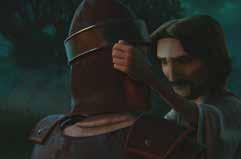
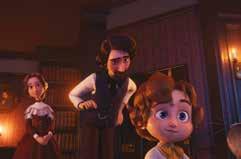

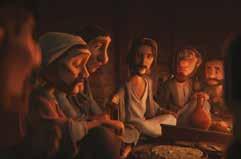

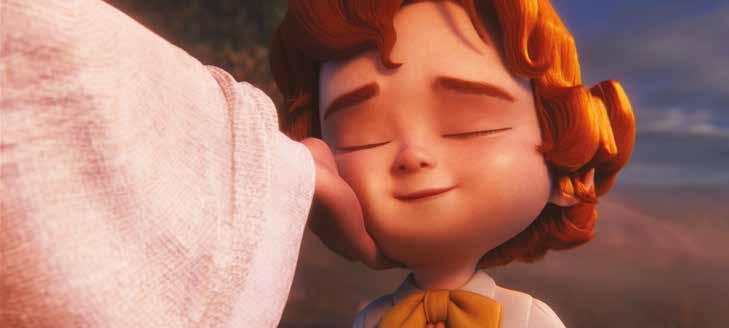
a variety of voiceover roles, including those of Fred Flintstone, superheroes Spider-Man and Green Lantern, and Leonardo in Teenage Mutant Ninja Turtles. He has also been a voice double for Michael J Fox, Johnny Depp and Ewan McGregor.
When asked about his favourite roles, James is diplomatic: ‘I try to say whichever one I’m working on at that time.’
But before long, he reels off his career highlights through a series of accents. I smile as he switches between different voices, including that of a certain character which he played in the animated series Star Wars: The Clone Wars
‘I would be remiss if I did not say 23 years as the voice of Obi Wan Kenobi: “The force is strong with me.”’ His work has also included video game voiceovers.
‘I’ve been Ratchet for 20-plus years in a series called Ratchet and Clank, and in Final Fantasy X I was the voice of the main character Tidus. I’m Magneto right now in the new Marvel Rivals game.’
But health issues once threw his voice acting career into uncertainty.
God works miracles every day in our lives
Jameshas explained in the past that his house was shoddily constructed. As builders hammered in nails, they pierced the water pipes, which leaked into the walls. Ten months after moving in, James noticed that some skirting looked wet and swollen.
As he ran his hand across the weakened wall, a hole developed. Looking inside it, he breathed in six
types of black mould. His symptoms included agitation, sensitivity to touch, and difficulty concentrating, sleeping and eating. And on 13 February 2005, he woke up unable to talk.
He tells me that on that day he silently prayed: ‘Please, Lord Jesus, don’t let this be the worst day of my life.’
Gradually, he regained the ability to talk with the help of a voice coach. But James believes that God answered his prayer in another, extraordinary way.
‘At the time, my wife and I were in the process of adopting our daughter,’ he says. ‘When we received the paperwork six months later, it turned out that 13 February 2005 was the day she was born.
‘God made it the best day of my life: the day I became a dad. He works miracles every day in our lives. We just have to be able to see them.’
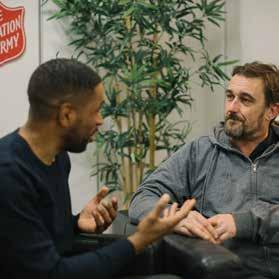

A
former resident
Feature by Claire Brine
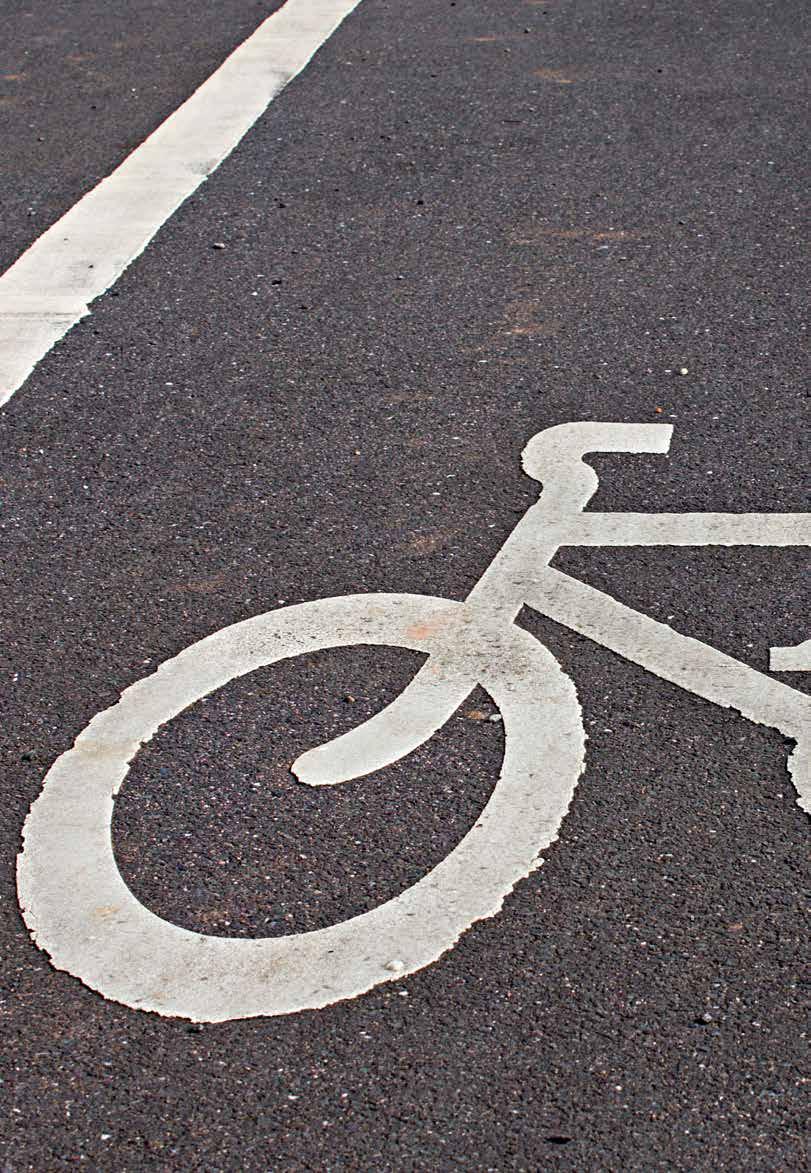
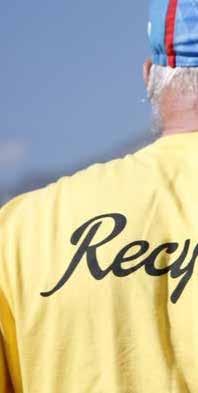
Bbike repair scheme at a Salvation Army hostel has helped many people experiencing homelessness to head towards a
who
describes volunteering
efore encountering The Salvation Army, Justin had experienced homelessness, lost close family members and endured abusive relationships. But, despite his challenging past, he found new purpose thanks to Booth House, a Salvation Army hostel – or ‘Lifehouse’ – in Swindon.
During his two-and-a-half-year stay, Justin discovered a passion for bike mechanics and began volunteering in the Lifehouse’s bike repair centre, called Recycles. The supportive environment and guidance from staff helped him to grow in confidence and learn valuable skills. Twelve years later, he remains an eager volunteer in the workshop –and is also planning to complete an apprenticeship in bike mechanics.
Born in Jamaica, Justin had a difficult start in life when he was diagnosed with type 1 diabetes at the age of five. In order to receive the medical treatment
better future – including a
at Recycles as the ‘best thing ever’
that he needed, his family moved to Chippenham. But getting used to life in the UK wasn’t easy – and his parents eventually separated. Justin lived with his mum until he was eight years old.
‘She ill treated me and made me extremely uncomfortable,’ Justin says. ‘She would literally tell me: “I regret having you. You were not planned.”’
Justin’s mother was also involved in several relationships that exposed him to violence and abuse. He can remember one particular incident that had lifechanging consequences.
‘I was crying, and my mother’s partner picked me up and threw me from one side of the room to another,’ he recalls. ‘I hit the window and suffered a brain injury. I have dyslexia because of that.’
Feeling unsafe at home, Justin went to live with his father. But life was still challenging – particularly at school.
‘It was hard work, because obviously
the language was different,’ says Justin. ‘I found it difficult to understand. I also had people telling me: “Go back to where you came from.” This hurt a lot.’
Despite the struggles, there were aspects of school life that Justin enjoyed, such as PE, going on day trips and meeting new people. Later, he enrolled at a boarding school – but he missed his dad. The two shared a close bond. Then, when Justin was only 19, his dad died.
‘It was a big hit,’ Justin says, ‘because he wasn’t just a dad. He was my best friend, he was my rock, he was my inspiration. He was someone that I looked forward to seeing every day.’
After leaving college, Justin relocated to Swindon. He found a job within the council, but he ended up leaving the role because of health problems. The loss of his job was then followed by the ending of a long-term relationship. Living alone
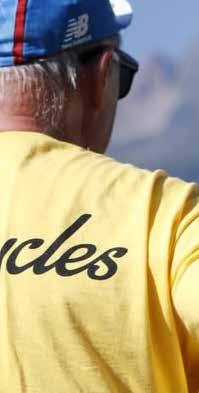
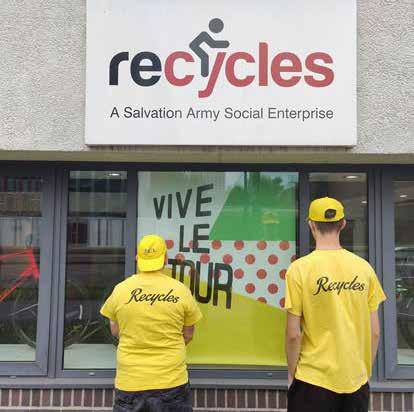


and unable to afford his rent, Justin became homeless.
With nowhere to go, he stayed for a short while in a bed and breakfast. Then he moved into The Salvation Army’s Booth House. It turned his life around. The staff enrolled him in language classes, and his literacy skills improved.
I felt more comfortable with myself and relaxed
‘Before, I couldn’t read, wasn’t able to write, I wasn’t able to do so many things because of the brain injury,’ explains Justin. ‘But then, everything improved.
‘The Lifehouse basically helped me get on my feet by building my confidence and making me a strong person. They have good support workers. I felt more
comfortable with myself and relaxed.’
Justin also started volunteering with Recycles, a Salvation Army social enterprise which offers Lifehouse residents the opportunity to undertake training in bike repairs. The skills acquired are designed to help them as they seek future job opportunities.
‘Volunteering has been the best thing ever because I’ve been able to gain the experience I need,’ says Justin. ‘I’m hoping to put it to good use and get the qualifications I want.’
Though 12 years have passed since Justin first arrived at Booth House and even though he now has a permanent home, he continues to volunteer at Recycles and hopes to complete an apprenticeship. Providing good customer service is important to him.
‘To see the customers go out with a smile on their face and knowing that they’ve got a bike from us – it’s a good
feeling,’ he says. ‘I love interacting with customers. I like to be out on the front line and finding out what it is they need.’
Justin is also full of praise for the Recycles workshop manager, Simon, who has been overseeing the repair centre for 13 years.
‘He’s a good inspiration and has trained me well,’ says Justin. ‘If there’s work that hasn’t been carried out correctly, he’ll show me and allow me to work on that bike, to get it where it needs to be. He has been the best part of my life and helped me get to where I am.
‘If I wasn’t here and didn’t get the help that I need, then I don’t know where I would be. I probably wouldn’t have what I’ve got now. Hopefully I can pass on my trade to my son, and he will grow with the legacy of picking up where I am.’
l Justin’s name has been changed

ACROSS
3. Hot spring (3)
7. Language (6)
8. Responds (6)
9. Getaway (6)
10. Attack (6)
11. Horse (3)
12 and 21 across. Noël Coward play (6, 6)
14. Impede (6)
17. Andi _____ , TV presenter (6)
21. See 12 across
24. Devour (3)
25. Architectural style (6)
26. On horseback (6)
27. Cultivated (6)
28. Groups of nine (6)
29. Ovum (3)
DOWN
1. Official based overseas (6)
2. Appalled (6)
3. Calm (6)
4. Irish county (6)

5. Two-wheeled carriage (6)

6. Try hard (6)
12. Bread roll (3)
13. That girl (3)
15. Mountain (3)
16. Decay (3)
18. Unfamiliar (6)
19. Breathe out (6)
20. Withdraw (6)
21. Thread (6)
22. Halogen (6)
23. Natural (6)


Rot. 18. Exotic. 19. Exhale. 20. Secede. 21. String. 22. Iodine. 23. Innate. HONEYCOMB 1. Parcel. 2. Sheath. 3. Squash. 4. Madame. 5. Forage. 6. Octave.
Tilled. 28. Nonets. 29. Egg. DOWN: 1. Consul. 2. Aghast. 3. Serene. 4. Armagh. 5. Hansom. 6. Strive. 12. Bap. 13. Her. 15. Alp.
Peters. 21. Spirit. 24. Eat. 25. Gothic. 26. Riding.
Assail. 11. Nag. 12. Blithe. 14. Hamper.
QUICK CROSSWORD ACROSS: 3. Spa. 7. Tongue. 8. Reacts. 9. Escape.


INGREDIENTS
75g butter
8 hot cross buns
100g National Trust marmalade
75g dark chocolate, crumbled
3 free range eggs
250ml whole milk
100ml double cream
25g caster sugar

METHOD
Preheat the oven to 180C/Gas Mark 4. Grease a 1l pie dish with 25g butter.
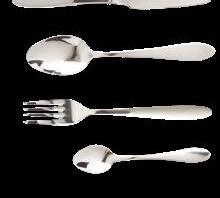


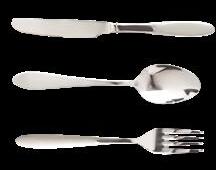
Cut the hot cross buns in half and spread each slice with the marmalade. Arrange the bun halves in the pie dish, stacked up against each other, then sprinkle chunks of chocolate over the top and set aside.
Crack the eggs into a bowl and add the milk, cream and sugar. Use a balloon whisk or fork to whisk until combined, then pour the custard over the hot cross buns in the pie dish and leave to stand for 30 minutes.
Break the remaining butter into small pieces and scatter over the top of the pudding.
Place the dish in the oven and bake for 30-40 minutes, or until the custard has set and the top is golden brown.
Serve immediately.
INGREDIENTS
250g baking margarine
180g caster sugar
75g soft light brown sugar
50g golden syrup
1tsp vanilla essence
375g self-raising flour
50g cocoa powder
Toppings of your choice, such as mini chocolate eggs

METHOD
Preheat the oven to 160C/Gas Mark 3. Line a baking tray with parchment paper.
Place the margarine and sugars in a large bowl and use a spoon or whisk to beat together until smooth.
Add the golden syrup and vanilla essence and mix again until combined. Add the flour and cocoa powder and gently mix.
Split the dough into 12 even pieces, then place on the lined baking tray and flatten gently, spacing them out a little, as they will spread when cooking. Add any toppings of your choice.
Place the tray in the oven and bake for 12-14 minutes, until slightly firm and cracked on top. Remove from the oven and leave to cool, before serving.


General Lyndon Buckingham